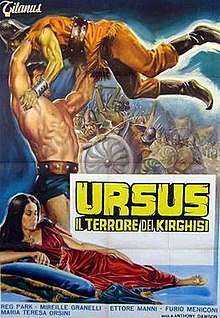Hercules, Prisoner of Evil
Hercules, Prisoner of Evil (Italian: Ursus il terrore dei Kirghisi, lit. 'Ursus, Terror of the Kirghiz') is a 1964 Italian peplum film directed by Antonio Margheriti and an uncredited Ruggero Deodato. Deodato, the official assistant director, replaced Margheriti as he was busy with the completion of the film The Fall of Rome. Deodato actually directed most of the film in actuality but Margheriti was credited as the director.[2][3] The film is filled with a variety of horrific themes and elements, featuring a killer werewolf, and is as much a horror film as it is a peplum.[4]
| Hercules, Prisoner of Evil | |
|---|---|
 | |
| Directed by | |
| Produced by | Adelpho Ambrosiano[1] |
| Screenplay by | Marcello Sartarelli [1] |
| Starring | |
| Music by | Franco Mannino[1] |
| Cinematography | Gabor Pogany[1] |
| Edited by | Otello Clangeli[1] |
Production companies |
|
Release date |
|
Running time | 100 minutes[1] |
| Country | Italy[1] |
Plot
The mighty Ursus is given a potion to drink that transforms him on certain nights into a murderous werewolf. Ursus kills several innocent people in the forest in this unusual film before realizing that he himself is the creature the local villagers are seeking to destroy. Ursus is referred to as Hercules in the English-dubbed prints.
Cast
- Reg Park: Ursus
- Mireille Granelli: Aniko
- Ettore Manni: Ido
- Furio Meniconi: Zereteli
- Maria Teresa Orsini: Kato
- Lilly Mantovani: slave
- Serafino Fuscagni: Mico
- Ugo Carboni
- Claudio Scarchilli
- Gaetano Quartararo
- Giulio Maculani
Release
Hercules, Prisoner of Evil was released in Italy on July 31, 1964.[1]
References
- Kinnard & Crnkovich 2017, p. 91.
- Roberto Poppi; Mario Pecorari. Dizionario del cinema italiano. I film. Gremese Editore, 2007. ISBN 8884405033.
- Harvey Fenton; Julian Grainger; Gian Luca Castoldi. Cannibal holocaust: and the savage cinema of Ruggero Deodato. FAB Press, 1999. ISBN 0952926040.
- Antonio Bruschini; Antonio Tentori. Operazione paura: i registi del gotico italiano. PuntoZero, 1997. ISBN 888694506X.
Sources
- Kinnard, Roy; Crnkovich, Tony (2017). Italian Sword and Sandal Films, 1908-1990. McFarland. ISBN 1476662916.CS1 maint: ref=harv (link)